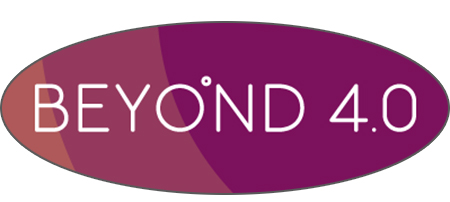BEYOND 4.0: Inclusive Futures for Europe BEYOND the impacts of Industrie 4.0 and Digital Disruption
Research area Innovation and education in the digital society | Dr. Michael Kohlgrüber | Clara Behrend | Mathias Cuypers | Antonius Johannes Schröder | Beata Lewandowska
BEYOND4.0 aims to help deliver an inclusive European future by examining the impact of the new technologies on the future of jobs, business models and welfare. We use a multidisciplinary research approach.

European Union - Horizon 2020
The BEYOND 4.0 project contributes to an inclusive European future by exploring the impact of new technologies on the future of jobs, business models and welfare. We use a multidisciplinary research approach realized by a high-level consortium with stakeholder participation throughout.
BEYOND 4.0 has five goals:
- To provide new, scientific insights into technological transformation;
- Gain new, scientific insights into the strategies of companies dealing with technological transformation;
- Review the impact of technological transformation on: a. Quality, content, and distribution of work; b. Skill requirements; c. Education and training; d. Value creation by firms;
- Examine policy options for: a. Fiscal policy (e.g., taxes on robots); b. Welfare policy (e.g., basic income);
- Identify approaches to social investment and methods for inclusive growth.
BEYOND 4.0 achieves this by:
- Using state-of-the-art research and results from other EU projects;
- Using innovative methods and
- Combining historical data, EU-wide data, regional data, and company-based data.
BEYOND 4.0 achieves the following results:
- A scientific understanding of the impact of new technologies;
- Diagnostic and development tools to exploit technology-driven opportunities;
- Evidence-based support for social and competitive policy strategy.
BEYOND4.0 addresses the priorities of the Horizon 2020 program (2018-2020) "Europe in a Changing World - Inclusive, Innovative and Reflective Societies".
BEYOND 4.0 will:
- Address the challenges of the 4th Industrial Revolution in the context of digitalization by identifying alternative policy options;
- Contribute to equitable, sustainable prosperity;
- Contribute to the UN Sustainable Development Goals (1, 2, 5, 8 and 9).
- Nederlandse Organisatie Voor Toegepast Natuurwetenschappelijk Onderzoek (TNO - Coordination)
- University of Warwick
- Institute for the Study of Societies and Knowledge (Bulgaria)
- University College London (UK)
- University of Turku (Finland)
- Conservatoire National Des Arts Et Metiers (France)
- Helsingin Yliopisto (Finland)
- Universidad Del Pais Vasco (Spain)
The goal of BEYOND 4.0 is to soundly investigate the impact of new technologies on future jobs, business models and welfare within the EU.
Five steps to achieve the project's research goals and intended impacts:
Step 1: Develop common starting points (combining versch. approaches) Step 2: Gather information from three sources - historical data, use of data from EU-level surveys, inputs from pioneer countries, regions and companies Step 3: Evaluate cross-cutting issues, e.g., importance of technological transformation for employment, labor markets, occupational health and safety Step 4: Review possible policy approaches Step 5 : Integrate all steps into an outlook on the future of work.
Methodological aspects:
- Historical approach: meta-analysis of existing work, literature review, review of historical data
- Mapping of data: Integration of different European datasets. Further development to a new and accurate data base.
- Mapping regional experiences (case studies, WP4): Insights into regional strategies on how actors deal with the impacts of technological transformation (e.g. NRW).
- Mapping corporate experiences: Insights into corporate strategies dealing with digital transformation (identification of best practices).
- Predictions based on a broader set of approaches (than e.g. the predictions of Frey and Osborne, 2013).
Click here for the homepage of http://beyond4-0.eu/




![[Translate to English:] [Translate to English:]](/storages/zentraler_bilderpool/_processed_/a/f/csm_Kontakt_b86e8d8ecc.png)
![[Translate to English:] [Translate to English:]](/storages/sfs-sowi/_processed_/6/c/csm_Glasfront_sfs_Header_eae6d325d3.jpg)
